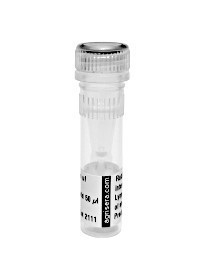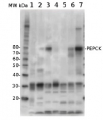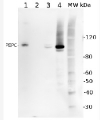1

Anti-PEPC | phosphoenolpyruvate carboxylase, ALP-conjugated (40 µg)
AS09 458-ALP | Clonality: Polyclonal | Host: Rabbit | Reactivity:A. comosus, A. thaliana, S. PCC 6803, Ch. velia, H. vulgare, J. curcas, Lupinus sp. , M. crystallinum, N. tabacum, O. sativa, Saccharum spp. hybrid clone C91-301, S. laricifolia, Z. mays, Synechocystis sp. , P. tricornutum (strain CCAP 1055/1), T. weissfloggi
Benefits of using this antibody
- Product Info
-
Immunogen: KLH-conjugated synthetic peptide well conserved PEPC1 and sequences from different plant species including Arabidopsis thaliana Q9MAH0, At1g53310 (PEPC 1), Q84VW9, At3g14940 (PEPC 3). The peptide chosen to elicit this antibody is also perfectly conserved in bacterial type of this enzyme NP_177043.2 (PEPC 4)
Host: Rabbit Clonality: Polyclonal Purity: Immunogen affinity purified serum in PBS pH 7.4. Format: Liquid Quantity: 40 µg Storage: Store at 4°C for 12-18 months. A preservative may be added for long time storage up to 2 years. Tested applications: Western blot (WB) Recommended dilution: 1 : 1000 (WB) Expected | apparent MW: 110 | 105 kDa
- Reactivity
-
Confirmed reactivity: Ananas comosus, Arabidopsis thaliana, Synechocystis PCC 6803, Chromera velia, Hordeum vulgare, Jatropha curcas, Lupinus sp., Mesembryanthemum crystallinum, Nicotiana tabacum, Oryza sativa, Saccharum spp. hybrid clone C91-301, Salsola laricifolia, Zea mays, Synechocystis sp. , Phaeodactylum tricornutum (strain CCAP 1055/1), Thalassiosira weissfloggi Predicted reactivity: Cucumis sativus (PEPC1,PEPC2,PEPC3), Flaveria trinervia, Glycine max, Lupinus albus, Mammillaria thornberi, Manihot obovata, Medicago sativa, Morinda citrifolia, Nopalea gaumeri, Opuntia macbridei, Pachycereus pringlei, Solanum tuberosum, Spinacia oleracea, Streptanthus tortuosus, Pachycereus hollianus, Pisum sativa, Phaseolus vulgaris,Triticum aestivum, algae, diatoms: Thalassiosira pseudonana, other species: Salmonella sp., Schiedea hookeri, Shigella sp. Schiedea sarmentosa, Streptanthus farnsworthianus, Tacinga saxatilis,Yersinia sp. Vibrio sp.
Species of your interest not listed? Contact usNot reactive in: No confirmed exceptions from predicted reactivity are currently known - Additional Information
-
Additional information (application): Antibody can be also used following 2D gel electrophoresis - Background
-
Background: PEPC (phosphoenolpyruvate carboxylase), EC=4.1.1.31, belongs to an enzyme family of carboxy-lyases that is catalyzing adding fo carbon dioxide to phosphoenolpyruvate (PEP) to form oxaloacetate. Alternative names: PEPCase 1, PEPCase 3, PEPC 1, PEPC 3
- Protocols
-
Agrisera Western Blot protocol and video tutorials
Protocols to work with plant and algal protein extracts
Oxygenic photosynthesis poster by prof. Govindjee and Dr. Shevela
Z-scheme of photosynthetic electron transport by prof. Govindjee and Dr. Björn and Dr. Shevela - Reviews:
-
This product doesn't have any reviews.
Accessories

AS07 241 | Clonality: Polyclonal | Host: Rabbit | Reactivity: [global antibody] for plants Ananas comosus, Miscantus giganteus, Mouse, Nannochloropsis oceanica, Oryza sativa, Panicum maximum,, Panicum virgatum, Phaseolus vulgaris, Saccharum spp. hybrid clone C91-301, Spartina alterniflora, Spartina patens, Zea mays
Benefits of using this antibody

AS09 458 | Clonality: Polyclonal | Host: Rabbit | Reactivity: A. comosus, A. thaliana, C. ciliaris, C. gayana, C. velia, Ch. quinoa, H. vulgare, J. curcas, K. prostrata, L. fusca, Lupinus sp. , M. maximus, M. crystallinum, N. tabacum, O. sativa, P. antidotale, P. coloratum, P. strobus, Saccharum spp. hybrid clone C91-301, S. lanata, S. laricifolia, S. bicolor, Synechocystis PCC 6803, Phaeodactylum tricornutum (strain CCAP 1055/1), T. weissfloggi, Z. mays, Z. muelleri
Benefits of using this antibody
